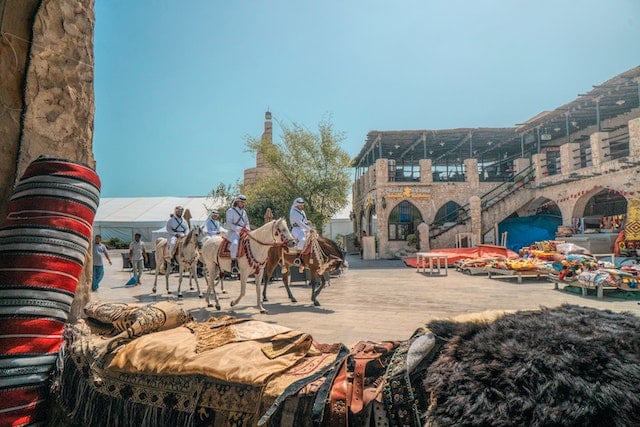15 Common Phrases in Arabic We All Should Be Using
With over 420 million speakers worldwide, Arabic is one of the most relevant languages in today’s interconnected world. On the one hand, it holds immense cultural and historical significance, as it is the language of the Quran and a key language of the Middle East and North Africa. On the other hand, Arabic-speaking countries are increasingly becoming global destinations for travel, business, and cultural exchange. Therefore, learning a few common phrases in Arabic can greatly enhance your communication skills and open doors to memorable experiences!
In this article, we will explore 20 common phrases in Arabic that can help you navigate Arabic-speaking cultures and make a positive impression on locals.
→Sign Up Now: Free Arabic Lesson With a Native Teacher!←
Common Phrases in Arabic to Greet People
In Arabic-speaking cultures, greetings play a crucial role in establishing connections and demonstrating respect. These simple phrases will help you start conversations and create a friendly atmosphere while showing locals that you’re willing to make an effort and communicate in their own language:
1. “Marhaba” (مرحبا): Hello
Used as a general greeting, “Marhaba” is appropriate for any time of the day and can be used with both acquaintances and people you’ve just met. Just make sure you don’t overdo it and say Marhaba to random strangers in the street!
2. “Sabah al-khayr” (صباح الخير): Good morning
This phrase is commonly used to greet someone in the morning and is a polite way to start the day. Just like its English counterpart, it can be used any time before noon!
3. “Masaa’ al-khayr” (مساء الخير): Good evening
Similar to “Sabah al-khayr,” this phrase is used to greet someone in the evening. If you want to use it as a conversation starter, you can add “Kayf al-asbaar?”, which means “How are things?”
4. “Ahlan wa sahlan” (أهلا وسهلا): Welcome
This warm and hospitable phrase is often used to welcome guests or express hospitality. For example: “Ahlan wa sahlan! Marhaban bikum!” (Welcome! We are glad to have you!)
5. “Ma’a salama” (مع السلامة): Goodbye
This phrase is used to bid farewell to someone and wish them safety. If you’re saying it to someone with whom you had a nice conversation, you can add “Raaja’an ila al-liqaa’!” (Hope to see you again!)

Image via Pexels
Common Phrases in Arabic to Show Courtesy
Politeness and respect are highly valued in Arabic-speaking cultures. In fact, politeness is so important that it’s often more effective than being able to speak the local language.
These common phrases in Arabic will help you show courtesy and engage in polite conversation:
6. “Shukran” (شكراً): Thank you
Expressing gratitude is essential. Whether someone has let you cut in line or given you directions, “Shukran” is one of the most common phrases in Arabic to say Thank you.
7. “Afwan” (عفواً): You’re welcome
This phrase is used to acknowledge someone’s gratitude and respond with “You’re welcome.”
8. “Min fadlak” (من فضلك): Please
When making a request or asking for assistance, “Min fadlak” adds politeness to your language. Saying “Min fadlak, momkin tusa’idni?” (Please, can you help me?) is naturally more polite than saying “Momkin tusa’idni?”.
9. “Ma’assalama” (مع السلامة): Goodbye
Similar to “Ma’a salama,” this phrase is used to bid farewell and wish someone safety. It’s like saying “Bye, take care!”. Just don’t forget to add a nice smile when you say it.
10. “Mumkin” (ممكن): Can/May I?
“Mumkin” is one of the most versatile phrases in Arabic. This word can be used to ask for permission or to inquire about the possibility of something. For example, you can use it to ask for directions: “Mumkin tusa’idni ila al-maktab?” (Can you help me find the library?).

Image via Pexels
Speaking about asking for help…
Common Phrases in Arabic to Ask for Help
When visiting Arabic-speaking countries, knowing how to ask for assistance is crucial. And, no, we are not just talking about accidents and emergencies here! Whether you need to ask for instructions or find the nearest English speaker, these common phrases in Arabic will greatly enhance your experience.
11. “Hal mumkin an tawaffirni?” (هل ممكن أن توفّرني؟): Can you help me?
No matter what you need, you can use this phrase to catch the attention of a passersby and ask them for assistance. For example: “Hal mumkin an tawaffirni bil-tarjama?” (Can you help me with a translation?)
12. “Hal tatakallam al-Injleziya?” (هل تتكلم الإنجليزية؟): Do you speak English?
Making the effort to use a few common phrases in Arabic here and there is very much appreciated – but, let’s face it, most locals are aware that visitors won’t be fluent in their language. If you need to communicate but your level of Arabic is limited, asking if someone speaks English is the best way to go.
13. “Ayna al-hammam?” (أين الحمّام؟): Where is the restroom?
When nature calls, this phrase will help you locate the nearest restroom. Just remember to add a nice “please” you the question: Ayna al-hammam, min fadlak? (Where is the restroom, please?)
14. “Mada taqool?” (ماذا تقول؟): What are you saying?
If you’re having difficulty understanding someone while trying out your spoken Arabic, politely ask them to repeat or clarify what they’re saying. You can say something like: “Mada taqool? Afwan, lam afham”. (What are you saying? Sorry, I didn’t understand.)
15. “Yumkinuni astiearat alhatifi?” (يمكنني استعارة الهاتف؟): Can I borrow your phone?
In case your phone runs out of battery, or you don’t have an international plan, asking to borrow someone’s phone can be quite handy. Just make sure you explain how important the call is and, more importantly, thank them for their kindness. Otherwise, you may be unwillingly acquainted with the fascinating world of Arabic curse words!
By familiarizing yourself with these 15 common phrases in Arabic, you’ll be better equipped to navigate Arabic-speaking cultures, establish connections, and make a positive impression.
Whether you’re traveling for leisure, conducting business, or engaging in cultural exchange, embracing the Arabic language will enhance your experiences and foster meaningful interactions.
→Sign Up Now: Free Arabic Lesson With a Native Teacher!←
So, take the first step, practice these phrases, and embark on a journey of language and cultural exploration!
Would you like to find someone with whom to practice your pronunciation in the Arabic language? At Language Trainers, we work with native instructors who provide one-to-one Arabic lessons tailored to your individual needs. All you have to do is contact us with a quick message and we’ll match you with the perfect Arabic teacher for a tailor-made learning experience.
